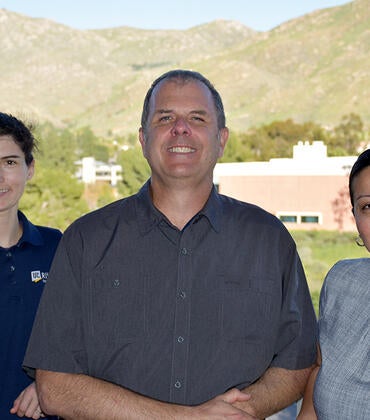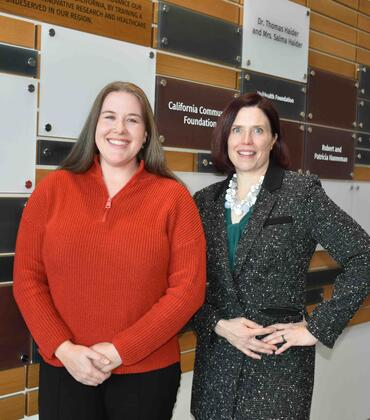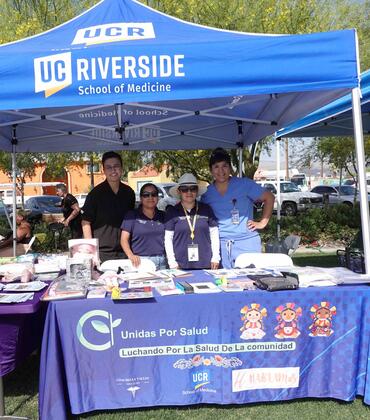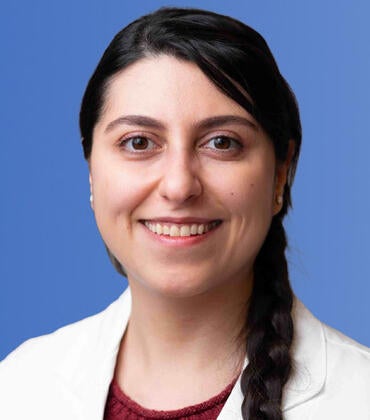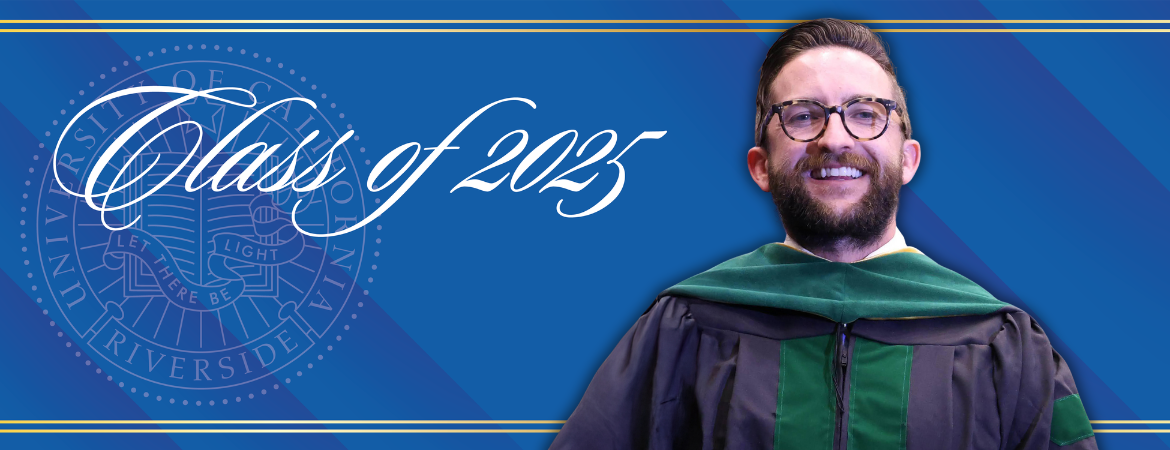
When a friend asked James Elkins, UCR School of Medicine class of 2025, to help at an immigration shelter as an Emergency Medical Technician (EMT), Elkins imagined migrants as people escaping persecution to find safety in their new home. “I had this thought in my head that I'm going to be helping these people, and we're going to be caring for them, which to me meant being nice to them and having a nice place for them to stay,” he recalled.
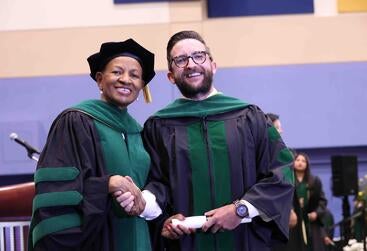
That all changed when the prison transport bus pulled up at midnight to a San Diego church where Elkins waited in the rain. An armored guard stepped off first, followed by a group of people unprepared for the weather. “Their clothes looked dirty, they all looked sick, everybody looked tired, there were babies just in diapers with no clothing at all in the cold,” Elkins said. “I just felt lost, like what can I even do?”
With little medical support at the shelter, Elkins took over checking the migrants for lice, scabies, and other health conditions before admitting them for access to food and rest. The experience, he said, rocked his world. “It became painfully clear in that moment that there's a need for care providers who want to work in these communities,” he said. “So that's really the crux of why I ended up going into medicine.”
As Elkins devoted more time to working in shelters and providing case management, migrants’ stories haunted him. “Things like murder, kidnapping, rape, extortion, those are things that if they happened to a friend it would be like, ‘oh my god,” he said. But, he continued, those experiences were common for migrants. “Everyone had something horrible happen to them in their home country or on their journey,” he said. Their stories increased Elkins' commitment to serving migrant communities, particularly those he worked with across the Inland Empire region, and led him to the UCR School of Medicine.
“UCR’s mission really is about serving underserved individuals in Inland Southern California,” Elkins said. “I'm so happy I ended up at UCR because it's allowed me to do things that I would have never gotten involved in… so UCR became this perfect place for me to pursue this mission and feel the support.”
Holding onto his dream through medical school
Elkins said that while he enjoyed his medical studies, the years of school presented unexpected challenges. “Whatever dreams you have before medical school, you have to hang on to them for seven years,” including residency training, he said. “Yes, I went out to a free clinic in Coachella Valley, I was involved on the board with that free clinic, and I did research in that community, so to a certain extent I was involved, but before I started medical school I was involved in the community six to seven days a week and now I do it a lot less.”
Still, he said UCR gave him more opportunities to work in the community than he may have had at other medical schools, while allowing him to stay in touch with his migrant support contacts in San Diego. “I think Riverside really allowed me to cultivate that dream of working with these communities and returning to them in a way that I felt I wanted to,” he said.
Elkins used his Spanish language skills to volunteer at the student-run Coachella Valley Free Clinic, including serving as one of two mental health coordinators for two years. He also collaborated with Ann Cheney, PhD, an associate professor at the SOM and the faculty director at the Coachella Valley Free Clinic, on research investigating trauma that the clinic’s indigenous patients faced during the COVID-19 pandemic.
Elkins’ nearly hourlong interviews with study participants, he said, felt natural, reminding him of conversations he’d had with migrants. “A lot of the traumas were a different level of the things that I had heard in the shelter context, but things like domestic violence came up quite a bit, alcoholism, depression, anxiety, suicide, and a lot of that came out of isolation,” he said.
An unexpected theme arose again and again: the need for expanded mental health resources at the free clinic. “It was the same kind of individuals that I grew up around in my family, who are very close minded to these kinds of ideas but are now fired up about it,” Elkins said. The purpose of the research was to shed light on the pandemic’s mental health effects within the community, but the findings became a motive for changing the clinic’s offerings. As a result of the research, Elkins said, they began bringing therapists from UCR to the clinic to provide walk-up appointments for patients.
Treating patients’ trauma
Elkins’ work with both migrants and patients who had experienced trauma led him to focus on psychiatry, which he’ll be pursuing as a resident starting this summer at Kaiser Permanente in Oakland, CA. “In detention, migrants’ interactions with ICE (Immigration and Customs Enforcement) officers or border patrol officers were usually pretty negative and oftentimes very inappropriate and derogatory, so it was important to set up a space where folks could talk if they wanted to,” he said.
He particularly remembers one young migrant with scabies who was placed in an isolated room to prevent the skin condition from spreading. When Elkins walked by, he noticed that she looked scared so opened the door to ask if she was OK. “She started to talk about how the room she was in reminded her of something that had happened to her on the way, and basically started to recount her story of torture and kidnap and rape that she experienced on her way northbound,” he recalled. “Every single time I heard a story like that, I just felt like… what happens to that person, and that level of trauma is not going to go away.”
“It left this burning question of, how do we help these people?” Elkins continued. “So that's why I'd say it really makes sense that I'm going into psychiatry.”
He recognized the clear need for longer term support. “I remember this mom, she and her kids were super traumatized from rape, kidnap, extortion all along the way and in front of the kids,” Elkins said. He helped the family get settled in an apartment with access to a food bank, a school nearby, and other resources, but soon discovered that the kids weren’t going to school. When he went to check on them, he found that the mother was afraid to leave their home because of their past experiences. “She's now in a totally different context, in a safe neighborhood where she can go outside, but her kids can’t play outside without fear of being kidnapped again,” he said. “I'm very interested in working with folks like that and hopefully helping them achieve some level of functionality that allows them to… gain this independence.”
Elkins also hopes to play a role in the rising acceptance of mental health care that he said may have come out of the COVID-19 pandemic. “Growing up, you would hear people say, ‘Why would I go see a psychiatrist? That's for crazy people,’ whereas now people are like, ‘Actually, I want to talk about things and get it off my chest,’” he said. “So there's kind of this historical transition, specifically in Latin American communities, and it's a part of history that I want to be on.”
Returning to his dream of helping migrant communities
Elkins encouraged other medical students to stay focused on their dreams throughout school. “Looking back, I think that I went really hard on the academics side, but I wish that I would have just followed my heart more and done more community work, and I would probably feel more fulfilled,” he said. “Every medical student is very driven about something, and whatever that is, if they just stick to that, it'll be fine.”
After his residency training, Elkins looks forward to returning to working with the migrant community, this time as a psychiatrist. “It has to be refugee, asylum-seeking, undocumented communities, I need to be around one of those,” he said. “I'm obsessed with my mission, and my wife is beautiful and amazing and she puts up with it.”
“It is so important to go above and beyond for your patients, especially those who are underserved,” he continued. “For that single mom who's from another country, who's trying to figure out English, who's trying to work a job, and now is afraid because the president said that she's going to get deported because she's not from here, and now she has some health problem and it's already a hard system to navigate–you need to go out of your way for those people,” he explained, adding that his work takes time from his family but that they understand because it means so much to patients. “Those people need it badly, and when you see that your help is actually helping, you'll get it and it'll become crystal clear.”
